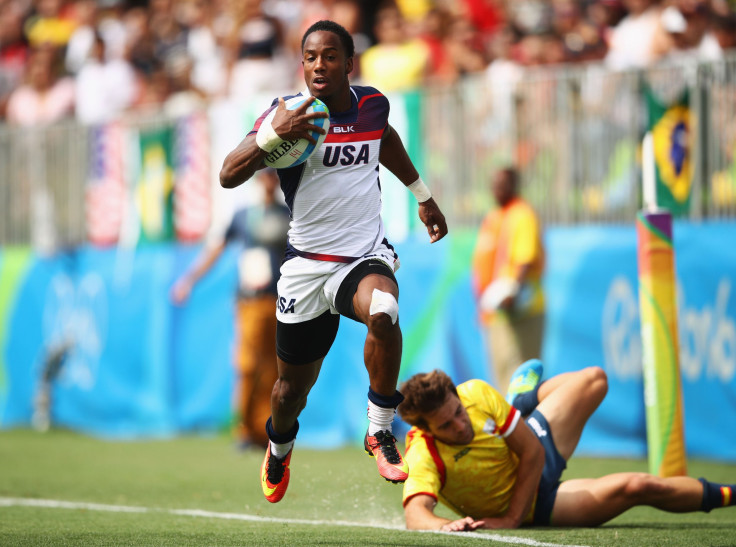USA Rugby Sevens: Carlin Isles Targets Further Success In Rugby And Beyond After First Olympics

In an Olympic Games that had its share of highs and lows, from the record-breaking achievements of Usain Bolt and Michael Phelps to Ryan Lochte’s misadventures, the return of rugby provided one of Rio’s resounding success stories. The shorter, more explosive seven’s version of the sport caught the public’s imagination with among other things a first ever medal, and a gold at that, for Fiji, an appearance by Academy Award winner Matthew McConaughey, as well as a marriage proposal. It was, said World Rugby chairman Bill Beaumont, a “game-changer” for the sport.
After a 92-year absence, rugby was back on the world’s biggest stage. The man whose star shined brightest of all, however, at least in terms of try scoring, had only picked up a rugby ball for the first time four years ago, just ahead of the last Olympic Games in London.
Carlin Isles had hoped to be going to those London Games to compete on the track in the 100 meters. He had, after all, run a personal best of 10.13. That would be good enough to get on the team for plenty of countries, but not the United States. Instead, a chance encounter with a rugby video online prompted his Olympic dream to take a turn he could never have imagined.
Rather than becoming a track star, the Ohio native from humble beginnings became the fastest man in rugby.
His Olympic dream was finally fulfilled in Rio, where he showcased his devastating speed on the wing, scoring six tries. Isles, though, took the experience in his stride.
“It was a great experience, but to me it was just another tournament,” he told International Business Times in a phone interview on Wednesday. “It was great, the whole atmosphere, you see a lot of different athletes, guys you watch on TV.
“Of course you have to soak it in, but for me it was just showtime. Walking out and seeing all the people cheering made it more exciting to play. Any tournament you go to you embrace it, but you got to take care of business.”
While Isles took care of business, a U.S. side that also featured New England Patriots safety Nate Ebner could only finish ninth. The team was ultimately eliminated from medal contention by Fiji, although its five-point loss was as close as any team got to the eventual gold medalist in the tournament. Still, with the U.S. having improved rapidly in the sport in recent years, winning a leg of the Sevens World Series for the first time last year, Isles was disappointed.
“We should have beaten Fiji and we should have beaten Argentina,” the 26-year-old said. “We were way better than what we showcased.”
Despite the setback of failing to take home a medal, the future looks bright for the sport in general and in the U.S. in particular. The U.S. will host the Rugby World Cup Sevens for the first time in 2018. Meanwhile, Isles was speaking ahead of the qualifying leg for the Red Bull Uni 7s tournament, which pits 11 of the best university teams from across the world against each other in Bath, England, next month.
“I know that there will be some people there that are being looked at, how well they do so it’s a great opportunity for them,” Isles said of the players who will compete from eight U.S. universities in Glendale, Colorado, on Thursday. “There is a great chance there could be some players competing in this tournament that play for Team USA in Tokyo in 2020.”
Isles arguably embodies the very reason for the success of sevens, both at the Olympics and in the U.S. For both players and fans who are new to rugby, the sevens version of the game isn’t weighed down by the same tactical complexities of the full 80-minute 15-a-side Rugby Union. Instead, with fewer players and just seven-minute halves, there is more space for explosive free-flowing rugby.
“It's appealing just because of the pace of the game. It’s short,” Isles explained. “It keeps people interested, they get to see different teams getting to put on a good show. It’s an exciting, fast-paced game. Everyone likes that. People like to see one-on-one stuff, footwork and tries, as well as the toughness of the sport.”
Already confirmed to be in the next Olympics in Tokyo in 2020, when it promises to be an even bigger success given Japan’s passion for rugby, the sport’s governing body is hopeful that sevens will now be a permanent fixture.
As for Isles’ future, there remain plenty of irons in the fire. And his Olympic adventure could yet take another divergent course. He plans to concentrate on sevens, as well as continuing to dip his toes in 15s rugby, track, and football — Isles was on the practice squad of the Detroit Lions in 2013 and had signed a futures contract before leaving to focus on rugby in 2014. But, inspired by fellow Red Bull athlete and track-star-turned Winter Olympian Lolo Jones, he is also planning to attend a bobsledding trial next month.
Whether he's remembered as a Summer Olympian, Winter Olympian, rugby player, track star, or a football player, Isles' plans boil down to one simple motto: “I’m just going to keep running fast.”
© Copyright IBTimes 2025. All rights reserved.





















